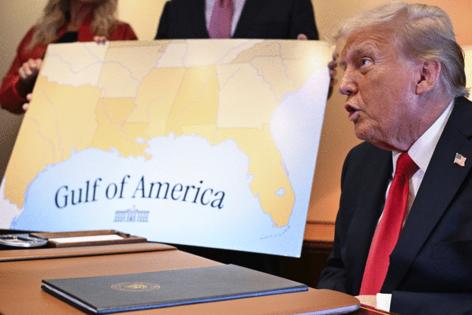House Republicans pass Gulf of Mexico renaming bill
Published in Political News
WASHINGTON — Legislation that would rename the Gulf of Mexico to the Gulf of America is “embarrassing,” “unserious” and a waste of time and taxpayer money, according to its Democratic detractors. But it sailed through the House on Thursday, passing on a mostly party-line vote.
Rep. Don Bacon of Nebraska was the lone Republican to break ranks and vote against the bill, which aims to codify a January executive order from President Donald Trump. The final tally was 211-206.
The bill now goes to the Senate, where it faces long odds.
Democrats were united in opposing what Rep. Mary Gay Scanlon, D-Pa., said “may be the dumbest bill brought to the floor during the six years I’ve served in Congress.”
“With all of the important work this Congress should be tackling, the speaker and House Republicans have chosen to indulge the president in a whim that the American public does not support,” Scanlon said from the House floor earlier this week.
The bill was introduced by Rep. Marjorie Taylor Greene, R-Ga., an outspoken Trump ally. It would require federal agencies to update federal documents and maps within 180 days of enactment, with the chairman of the U.S. Board on Geographic Names overseeing the process.
“The American people deserve pride in their country and they deserve pride in the waters that we own, that we protect with our military and our Coast Guard,” Greene said of her bill on the House floor Thursday.
The body of water borders not just the United States, but also Mexico and Cuba, all of which have jurisdictions there in various zones.
Some Republicans argued that Democrats’ opposition to the name change has more to do with their distaste for Trump than the actual proposal.
“The necessary renaming made by the president did not end the world, as some would like it to believe,” House Rules Chair Virginia Foxx, R-N.C., said during a Monday committee meeting. “We shouldn’t let certain allergic reactions to decisions made by the Trump administration stand in the way of good public policy.”
Foxx argued that the U.S. interest in the body of water “outpaces Mexico’s,” citing the “economic, cultural and commercial might that we passively exert on the Gulf.”
Since Trump unveiled his renaming plan in January, companies and local governments have grappled with whether to follow. Google Maps made the switch for users in the U.S., while The Associated Press faced retaliation from the administration for its style guidance.
A subset of House Republicans this Congress have done their best to legislatively curry favor with Trump through efforts to rename or rebrand things. Rep. Anna Paulina Luna, R-Fla., introduced a bill that would put Trump’s face on Mount Rushmore. Rep. Addison McDowell, R-N.C., proposed renaming Dulles International Airport in Trump’s honor. And Rep. Brandon Gill, R-Texas, introduced a measure that would put Trump’s face on the $100 bill.
Those are largely messaging bills with no real prospect of advancing in a closely divided House. But Greene’s proposal evidently has some legs, and even scored co-sponsors from some moderates, like New York Republican Reps. Nick Langworthy and Mike Lawler.
Still, it faces unlikely odds in the Senate, where at least seven Democrats would have to join their Republican colleagues to overcome a 60-vote procedural requirement.
House Republicans, meanwhile, insist it’s good policy that comes at little cost.
“Throughout our country’s history, presidents have changed the names of America’s lands and waters,” said Rep. Harriet M. Hageman, R-Wyo., who sits on the House Natural Resources Committee and testified on behalf of the bill earlier this week. “The change we are discussing today signals to the world that America is standing tall and that we are proud of our country. We are proud of our accomplishments, our history and our future.”
The Congressional Budget Office estimated that updating federal documents and maps would cost less than $500,000 over the next five years.
But Rep. Val Hoyle, D-Ore., who also sits on the Natural Resources Committee, speculated that the cost could be greater and extend beyond federal agencies if the name change caught on. A February Marquette University poll, which surveyed 1,018 adults nationwide, found that 71% opposed renaming the Gulf of Mexico.
“Who is going to pay for the maps, for the books, for the signs that municipalities, schools and libraries have to replace? We do as taxpayers,” Hoyle said. “We took an oath to obey the Constitution, not to obey the president, no matter what party they’re in.”
©2025 CQ-Roll Call, Inc., All Rights Reserved. Visit cqrollcall.com. Distributed by Tribune Content Agency, LLC.




























































Comments